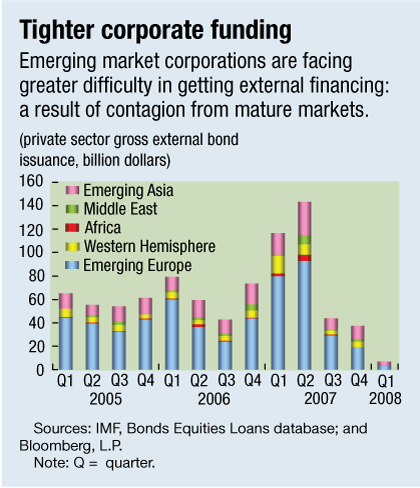
Typical street scene in Santa Ana, El Salvador. (Photo: iStock)
IMF Survey: Emerging Markets See Sharp Decline in Corporate Funding
April 16, 2008
Capital inflows to the corporate sector in emerging markets have witnessed dramatic declines in recent months, signifying spillovers from the funding and credit risks in mature markets in the wake of the ongoing financial crisis.

An Indian stock trader in Mumbai: the credit crunch in advanced economies has begun to affect emerging markets. (photo: Sajjad Hussain/AFP)
CREDIT CRISIS FALLOUT
Debt spreads in emerging corporate markets have widened and primary market bond issuance has fallen sharply as market conditions have deteriorated, according to the IMF's Monetary and Capital Markets Department. Private sector forecasts of emerging market corporate financing have been scaled back, with JP Morgan estimating financing at $72 billion for 2008, roughly half of last year's level.
So far, emerging market corporates had only issued $7 billion in the first quarter, so there are risks to the remaining $65 billion in the pipeline (see chart). "This shows very clearly that the financial condition for private corporations in emerging markets is hit by the financial crisis," IMF Managing Director Strauss-Kahn said at a press conference April 10. "That is one of the reasons why there is no decoupling, even though there may be some delay in the transmission of the slowdown of economic growth," he added.

Worrying trend
One reason this trend is worrisome is because the dedicated investor base for emerging market corporates is narrower than for sovereigns. Although some corporates are shifting into financing through syndicated loans and private placements, there is a risk that prolonged turbulence could begin to bind.
Corporate debt has been more correlated with similarly rated mature market credit than with other types of emerging market assets, especially sovereign bonds, according to the IMF's April 2008 Global Financial Stability Report (GFSR).
"With the expansion of emerging market corporate debt as an asset class, along with the development of CDS [credit default swaps] and index-based contracts that facilitate the trading of that debt, investors have drawn fewer distinctions between mature and emerging market debt," the GFSR observed.
The report noted that although this has been a positive development for the asset class, it has opened a "new potential channel of contagion." It warns that should mature market spreads widen further, it would increase emerging market corporate funding costs, putting pressure on domestic funding.
Comments on this article should be sent to imfsurvey@imf.org


